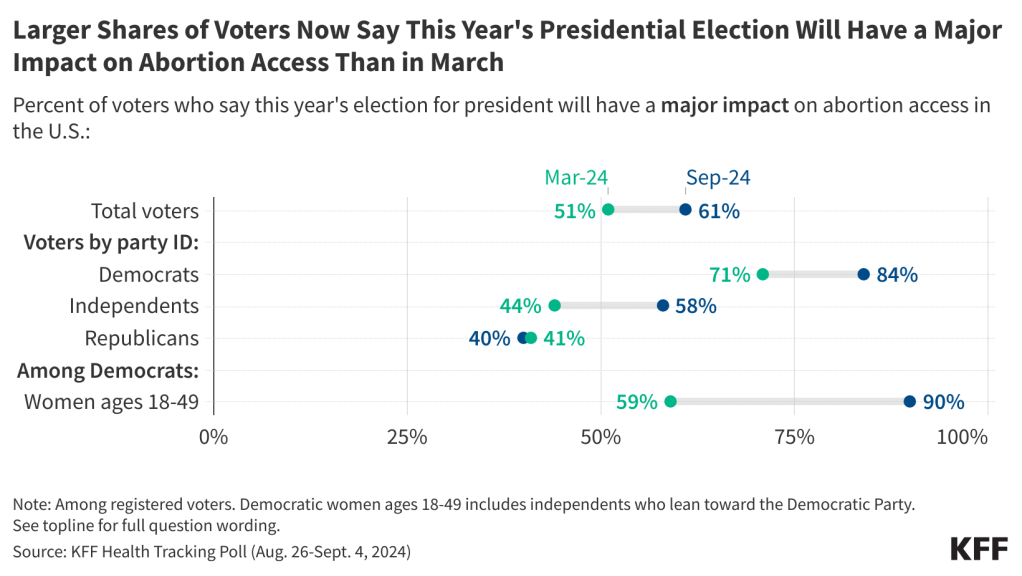
The independent source for health policy research, polling, and news.
A Growing Share of Voters See the Election as a Referendum on Abortion Access; Vice President Harris Holds a Strong Advantage on the Issue
Ahead of Presidential Debate, Many Voters Want to Hear the Candidates Address Health Care Costs
Most voters (61%) now say that the outcome of this year’s presidential election will have a major impact on access to abortion in this country – up 10 percentage points from March, a new KFF Health Tracking Poll finds.
The shift has occurred mainly among Democratic and independent voters over a period of time that saw Vice President Harris become the Democratic presidential nominee and make protecting abortion access a key component of her campaign.

Abortion resonates most with Democratic women voters of reproductive age (under age 50). About one in five (21%) in this group name abortion as their top voting issue.
Democratic women voters of reproductive age overwhelmingly (90%) say the presidential election will have a major impact on abortion access – up 31 percentage points from six months ago. The vast majority (93%) of this group of voters say that abortion should be legal in all or most cases.
Among all voters, Vice President Harris holds a large advantage over former President Trump on who they trust to do a better job on the abortion issue (53% vs. 34%). That’s a bigger lead on the issue than President Biden enjoyed earlier this year on a similar question before he dropped out of the race.
Vice President Harris also holds a narrower lead on trust to handle health care costs (48% vs. 39%). Independent voters give Harris an even bigger edge on health costs.
Meanwhile, former President Trump holds a large trust advantage among all voters on two major non-health issues: the economy and inflation (52% vs. 37%) and immigration and border security (54% vs. 36%). Independents also give the edge to former President Trump on these issues.
Among Health Issues, Voters Are Most Eager to Hear the Candidates Address Costs
Ahead of tonight’s presidential debate, voters identify costs as the health care issue that they most want former President Trump and Vice President Harris to talk about, likely reflecting broader concerns about the economy and inflation, which remains voters’ top overall issue.
Among Republicans and Republican-leaning independents, nearly half (45%) say they most want former President Trump to talk about health costs, offering responses like prescription drug costs and insurance premiums. A similar share of Democrats and Democratic-leaning independents (42%) say they most want Vice President Harris to talk about health care costs.
Other findings include:
- Among all voters, six in ten (61%) say they would prefer a federal law restoring a national right to abortion similar to what existed under Roe v. Wade than leaving it up to the states to decide whether abortion is legal or not (39%). In the 10 states where voters could decide abortion ballot initiatives, voters prefer a federal law to leaving it up to the states by a similar margin (62% vs. 38%).
- Among Democratic women voters under age 50, the vast majority (90%) say they favor a federal law restoring a nationwide right to abortion similar to what existed prior to the Supreme Court’s 2022 decision overturning its Roe v. Wade precedent.
- When asked directly about these issues, voters say it is important for the presidential candidates to talk about abortion (84%), access to birth control (79%), and In vitro fertilization, or IVF, (57%) on the campaign trail. At least three-quarters of Democratic voters say it is important for the candidates to talk about each of these issues, as do most independent voters. Most Republican voters also say it is important for the candidates to discuss abortion and birth control access, but less than half say the same about IVF.
Designed and analyzed by public opinion researchers at KFF, the survey was conducted August 26-Sept. 4, 2024, online and by telephone among a nationally representative sample of 1,312 U.S. adults, including 1,084 registered voters, in English and in Spanish. The margin of sampling error is plus or minus 4 percentage points for the full sample and among registered voters. For results based on other subgroups, the margin of sampling error may be higher.